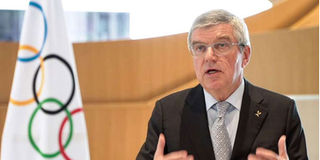Olympic chief to seek re-election

IOC President Thomas Bach during a past event.
What you need to know:
- The 66-year-old German was elected for an eight-year term as Olympic chief in September 2013
- Bach, who won gold for West Germany in the foil fencing team event at the 1976 Olympics, claimed a large number of IOC members had recently approached him asking if he would seek re-election
LAUSANNE
Thomas Bach said Friday he will stand in 2021 for a second term as president of the International Olympic Committee.
The 66-year-old German was elected for an eight-year term as Olympic chief in September 2013, taking over from Belgian Jacques Rogge. Bach will be eligible for a second and final four-year term.
Speaking at the 136th IOC Session, held virtually because of the coronavirus pandemic, Bach said: "If you, the IOC members, want, I am ready to run for a second term as IOC president and to continue to serve you and this Olympic movement we all love so much for another four years."
The IOC presidential elections are slated to take place in Athens in June 2021.
Bach, who won gold for West Germany in the foil fencing team event at the 1976 Olympics, claimed a large number of IOC members had recently approached him asking if he would seek re-election.
"I am grateful and deeply touched by the many words of encouragement and confidence," Bach said.
Elected an IOC member at the age of 37, Bach went on to play a series of influential roles within the organisation before being elected its ninth president.
He served as vice-president three times and was also chairman of the legal commission and head of anti-doping investigations.
Bach says his involvement in sports politics was sparked by West Germany's boycott of the 1980 Games in Moscow over the Soviet invasion of Afghanistan, and the government's disregard for athletes' concerns.
In 1981, he was elected as the Olympic athletes' spokesperson at the IOC Congress.
Under his reign as IOC chief, Bach has had to grapple with several political challenges, and has notably overseen the 2014 Sochi Winter Olympics and the 2016 Rio Summer Games, both perceived as the most troublesome in recent years.
He has also been a key player in the ongoing Russian doping saga, although the IOC came in for criticism from some quarters for not issuing Moscow with a blanket ban over its state-sponsored doping system.
Bach also came under fire for reinstating the Russian National Olympic Committee after the 2018 Pyeongchang Winter Olympics despite failed drugs tests there.
He is credited, however, with having put in place the Olympic Agenda 2020, reforms aimed at cutting costs and streamlining bidding processes to better attract potential host cities.
But the German lawyer and businessman could well have his biggest challenge ahead of him, in the form of the Covid-19 pandemic.
In a historic move, the Tokyo Olympics were in March postponed until 2021 - a first in peacetime.
There are fears over whether the Games will even go ahead next year, while Beijing is scheduled to host the 2022 Winter Olympics, just six months later.




